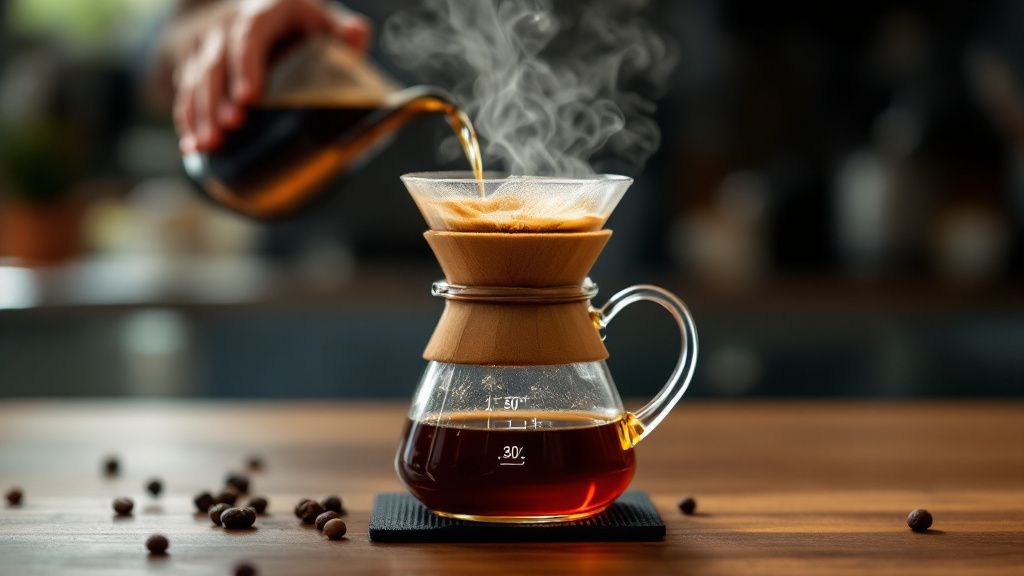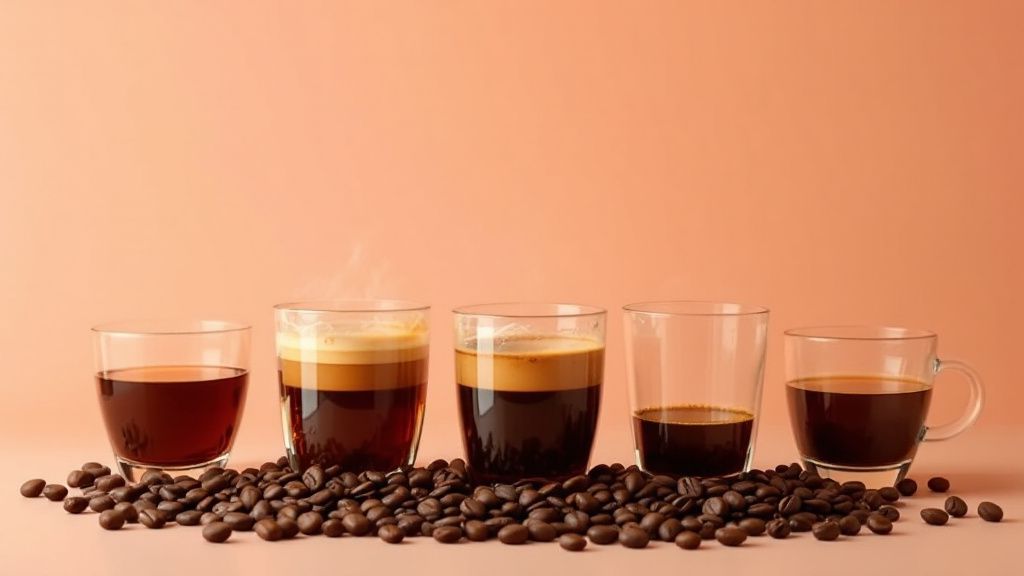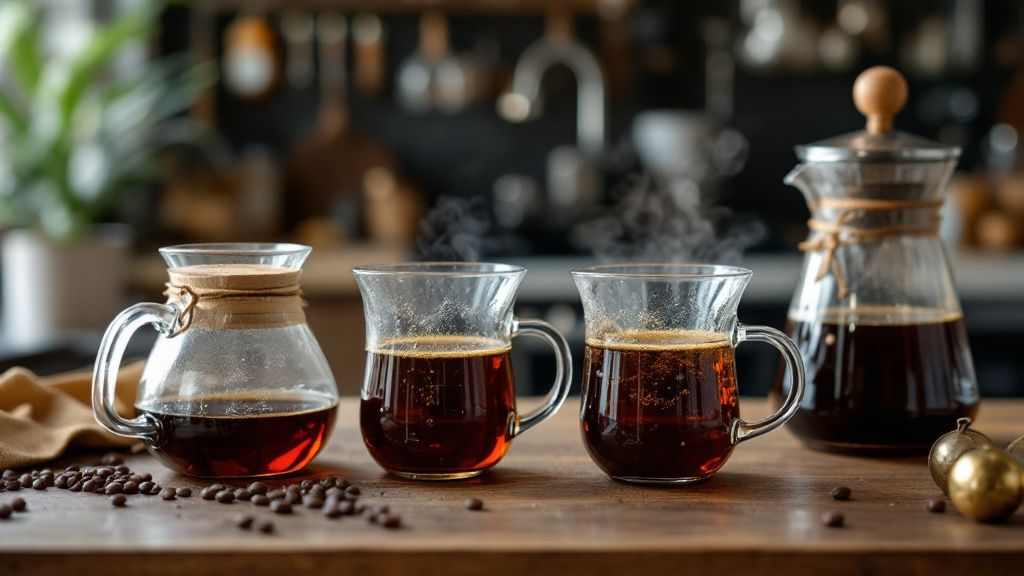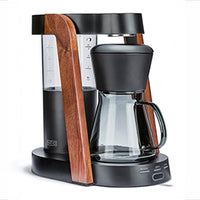How Does Brew Time Impact Coffee Flavor?
The duration you allow your coffee to steep or interact with its water source plays a pivotal role in defining its taste profile. A shorter brew time may produce a cup with a brighter and more acidic flavor, highlighting the subtle notes of the bean. However, extending the brew time extracts more robust and deeper flavors, which might introduce bitterness if not monitored carefully. As you experiment with different brew times, you'll be able to discern and adjust to your personal taste preferences, ultimately enhancing your coffee experience.

Understanding Brew Time in Coffee Preparation
How does brew time influence the richness of your daily brew? As you immerse yourself in brewing coffee at home, you realize that the intricacies of brew time are vital to developing its flavor. The brew time refers to the period the ground coffee remains in contact with water. This timing affects how much of the coffee's oils, flavors, and aromas are extracted, ultimately guiding the sensory experience you'll enjoy with each sip.
In a shorter brew time, less flavor is extracted, leading to a lighter taste. This method tends to highlight more acidic notes, often showcasing a crisp and bright profile. You might find this approach ideal for delicate coffee varieties, where you want the more nuanced flavors to shine through, unclouded by overpowering bitterness.
Conversely, a longer brew time increases the extraction process, creating a bolder, richer coffee flavor. This style is excellent for those who prefer a more full-bodied cup, with deeper, more intense notes. However, oversteeping can sometimes result in an unwanted bitterness or overly strong taste, so precision is key.
Different brewing methods require varying brew times. For instance, an espresso machine typically demands a quick, sharp extraction, while French press enthusiasts might allow for a slower, more prolonged period, each influencing coffee flavor uniquely. By experimenting with methods like these, you gain a better understanding of how brew time molds your drink.
Adjusting brew time can become an adventurous journey of taste exploration. Whether you desire a vivacious, light coffee or an intense, robust drink, understanding and modifying brew time can greatly enrich your brewing coffee at home experience. This empowers you to tailor each cup to your exact preference, enhancing the joy of savoring your personalized brew.

How Brew Time Affects Coffee Flavor
Exploring how brew time affects coffee flavor unveils a fascinating dimension of coffee preparation. In the process of brewing coffee at home, timing can significantly alter the aromatic and taste profiles of your cup. During brewing, water extracts various compounds that contribute to flavor, such as acids, oils, and sugars. Adjusting brew time can transform these elements, either enhancing or diminishing the distinct characteristics of your coffee.
For example, when you brew using a French press, a common recommendation is a brew time of four minutes. This duration allows a balanced extraction of flavors, yielding a rich and full-bodied coffee. If you extend the brew time beyond this, you may notice an increase in bitterness and a more pronounced, heavier coffee flavor, which can overwhelm the subtler taste notes.
For those using pour-over methods, the brew time is often related to the speed of the water flow and grind size. A slower, deliberate pour will extend the brew time, resulting in a more profound flavor due to greater extraction. However, a prolonged brew time with a finer grind can lead to over-extraction, giving your coffee a harsh and bitter taste.
Espresso, on the other hand, requires precise control with a quick brew time of about 25 to 30 seconds. This brief period under high pressure extracts intense flavors quickly. Altering this can significantly affect the balance, making the espresso either too weak or overly bitter if the duration isn't right.
Fine-tuning your brew time is essential in coffee crafting. By experimenting within these parameters, you can personalize your coffee experience, optimizing flavor based on your preferences, whether it's a fruity light brew or a robust rich blend. This nuanced control over taste helps make brewing coffee at home a rewarding venture.

Different Brewing Methods and Their Ideal Brew Times
Different brewing methods each have their ideal brew times, which are crucial for achieving the desired coffee flavor. In brewing coffee at home, understanding these times helps you make the most of your coffee's natural qualities. For a French press, an ideal brew time is about four minutes, allowing an even extraction that results in a robust and balanced cup with a rich taste and smooth mouthfeel.
When using a pour-over method like a V60, brew time typically ranges between two to four minutes. This method lets water flow through the grounds at a controlled pace, enhancing the flavors and aromas without over-extracting. Adjusting the speed of the pour and the grind size helps fine-tune the final flavor, allowing the coffee's bright, acidic notes or sweet undertones to stand out.
Espresso, known for its bold and concentrated flavor, demands a significantly shorter brew time, often around 25 to 30 seconds. This swift pressurization extracts intense flavors, creating a powerful and aromatic shot. Any deviation from this short time frame can throw off the balance, either weakening the coffee with a quick pull or making it overly bitter with a prolonged one.
One unpopular opinion about drip brewing is that extending the brew time past the norm might actually enhance certain complex flavors rather than just lead to over-extraction. While typically, drip coffee is brewed in about four to six minutes, experimenting with slightly longer times could reveal hidden depths in flavor not usually experienced with conventional brewing durations.
By exploring various brewing methods and adjusting the brew time, you enrich your coffee preparation experience. Tailoring the process according to each method's needs facilitates a deeper connection with your coffee, ensuring you extract the best possible taste while brewing coffee at home. This hands-on approach opens new avenues for discovering unique flavors and preferences.
Common Mistakes with Brew Time
Timing errors can significantly impact the coffee flavor when brewing coffee at home. One common mistake is rushing the brew time. If you cut the brewing short, it may lead to under-extraction, resulting in a sour and weak cup of coffee. This mistake often occurs when people are pressed for time or unaware of the importance of the correct duration.
Conversely, extending the brew time can lead to over-extraction, infusing unwanted bitterness into the coffee. This happens when you leave the coffee grounds in contact with water for too long, thinking it might increase strength. Instead, it disrupts the balance and masks the intricate flavors that make coffee delightful.
Inconsistent timing across different brewing methods is another pitfall. Each style, from espresso to French press, requires a specific timing for optimal result. Not adhering to these unique requirements can spoil your coffee flavor. Understanding different brew times for various methods is crucial.
Looking ahead, brew time control is expected to evolve with advancements in smart kitchen technology. Devices that regulate timing precisely could become mainstream, helping to minimize errors and ensure everyone can achieve the perfect cup. Personalized settings in machines could provide more consistency, making the brewing process easier and more enjoyable for coffee enthusiasts.
 Ratio Eight S2
Ratio Eight S2
 Ratio Eight Original
Ratio Eight Original
 Ratio Six
Ratio Six
 Ratio Four
Ratio Four
 Compare Machines
Compare Machines






